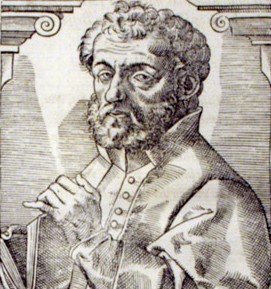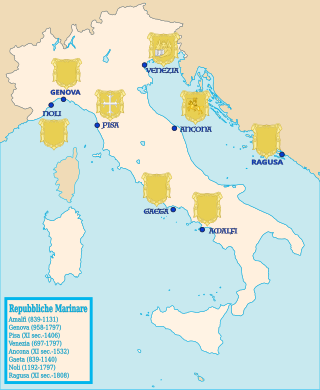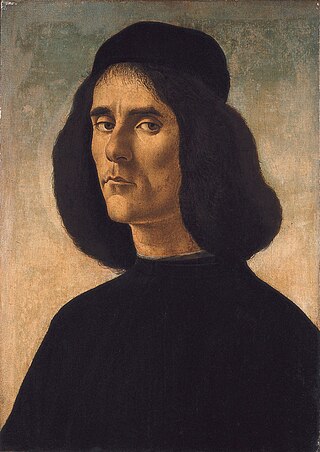Related Research Articles

Ambrogio Traversari, also referred to as Ambrose of Camaldoli, was an Italian monk and theologian who was a prime supporter of the papal cause in the 15th century. He is honored as a saint by the Camaldolese Order.

The Renaissance is a period of history and a European cultural movement covering the 15th and 16th centuries. It marked the transition from the Middle Ages to modernity and was characterized by an effort to revive and surpass the ideas and achievements of classical antiquity. Associated with great social change in most fields and disciplines, including art, architecture, politics, literature, exploration and science, the Renaissance was first centered in the Republic of Florence, then spread to the rest of Italy and later throughout Europe. The term rinascita ("rebirth") first appeared in Lives of the Artists by Giorgio Vasari, while the corresponding French word renaissance was adopted into English as the term for this period during the 1830s.

The Fourth Crusade (1202–1204) was a Latin Christian armed expedition called by Pope Innocent III. The stated intent of the expedition was to recapture the Muslim-controlled city of Jerusalem, by first defeating the powerful Egyptian Ayyubid Sultanate. However, a sequence of economic and political events culminated in the Crusader army's 1202 siege of Zara and the 1204 sack of Constantinople, rather than the conquest of Egypt as originally planned. This led to the Partitio terrarum imperii Romaniae or the partition of the Byzantine Empire by the Crusaders and their Venetian allies leading to a period known as Frankokratia, or "Rule of the Franks" in Greek.

Georgios Gemistos Plethon, commonly known as Gemistos Plethon, was a Byzantine scholar and one of the most renowned philosophers of the late Byzantine era. He was a chief pioneer of the revival of Greek scholarship in Western Europe. As revealed in his last literary work, the Nomoi or Book of Laws, which he circulated only among close friends, he rejected Christianity in favour of a return to the worship of the classical Hellenic gods, mixed with ancient wisdom based on Zoroaster and the Magi.

Bessarion was a Byzantine Greek Renaissance humanist, theologian, Catholic cardinal and one of the famed Greek scholars who contributed to the so-called great revival of letters in the 15th century.

George of Trebizond was a Byzantine Greek philosopher, scholar, and humanist.

Guarino Veronese or Guarino da Verona was an Italian classical scholar, humanist, and translator of ancient Greek texts during the Renaissance. In the republics of Florence and Venice he studied under Manuel Chrysoloras, renowned professor of Greek and ambassador of the Byzantine emperor Manuel II Palaiologos, the first scholar to hold such courses in medieval Italy.

ManuelChrysoloras was a Byzantine Greek classical scholar, humanist, philosopher, professor, and translator of ancient Greek texts during the Renaissance. Serving as the ambassador for the Byzantine emperor Manuel II Palaiologos in medieval Italy, he became a renowned teacher of Greek literature and history in the republics of Florence and Venice, and today he's widely regarded as a pioneer in the introduction of ancient Greek literature to Western Europe during the Late Middle Ages.

Renaissance humanism is a worldview centered on the nature and importance of humanity that emerged from the study of Classical antiquity. This first began in Italy and then spread across Western Europe in the 14th, 15th, and 16th centuries. During the period, the term humanist referred to teachers and students of the humanities, known as the studia humanitatis, which included the study of Latin and Ancient Greek literatures, grammar, rhetoric, history, poetry, and moral philosophy. It was not until the 19th century that this began to be called humanism instead of the original humanities, and later by the retronym Renaissance humanism to distinguish it from later humanist developments. During the Renaissance period most humanists were Christians, so their concern was to "purify and renew Christianity", not to do away with it. Their vision was to return ad fontes to the simplicity of the Gospels and of the New Testament, bypassing the complexities of medieval Christian theology.

The Italian Renaissance was a period in Italian history between the 14th and 16th centuries. The period is known for the initial development of the broader Renaissance culture that spread across Western Europe and marked the transition from the Middle Ages to modernity. Proponents of a "long Renaissance" argue that it started around the year 1300 and lasted until about 1600. In some fields, a Proto-Renaissance, beginning around 1250, is typically accepted. The French word renaissance means "rebirth", and defines the period as one of cultural revival and renewed interest in classical antiquity after the centuries during what Renaissance humanists labelled as the "Dark Ages". The Italian Renaissance historian Giorgio Vasari used the term rinascita ("rebirth") in his Lives of the Most Excellent Painters, Sculptors, and Architects in 1550, but the concept became widespread only in the 19th century, after the work of scholars such as Jules Michelet and Jacob Burckhardt.

Theodorus Gaza, also called Theodore Gazis or by the epithet Thessalonicensis and Thessalonikeus, was a Greek humanist and translator of Aristotle, one of the Greek scholars who were the leaders of the revival of learning in the 15th century.

Demetrios Chalkokondyles, Latinized as Demetrius Chalcocondyles and found variously as Demetricocondyles, Chalcocondylas or Chalcondyles, was one of the most eminent Greek scholars in the West. He taught in Italy for over forty years; his colleagues included Marsilio Ficino, Poliziano, and Theodorus Gaza in the revival of letters in the Western world, and Chalkokondyles was the last of the Greek humanists who taught Greek literature at the great universities of the Italian Renaissance. One of his pupils at Florence was the famous Johann Reuchlin. Chalkokondyles published the first printed publications of Homer, of Isocrates, and of the Suda lexicon.

The history of Italy in the Middle Ages can be roughly defined as the time between the collapse of the Western Roman Empire and the Italian Renaissance. Late antiquity in Italy lingered on into the 7th century under the Ostrogothic Kingdom and the Byzantine Empire under the Justinian dynasty, the Byzantine Papacy until the mid 8th century. The "Middle Ages" proper begin as the Byzantine Empire was weakening under the pressure of the Muslim conquests, and most of the Exarchate of Ravenna finally fell under Lombard rule in 751. From this period, former states that were part of the Exarchate and were not conquered by the Lombard Kingdom, such as the Duchy of Naples, became de facto independent states, having less and less interference from the Eastern Roman Empire.

Michael Tarchaniota Marullus was a Greek Renaissance scholar, Neo-Latin poet, humanist and soldier.

The Renaissance of the 12th century was a period of many changes at the outset of the High Middle Ages. It included social, political and economic transformations, and an intellectual revitalization of Western Europe with strong philosophical and scientific roots. These changes paved the way for later achievements such as the literary and artistic movement of the Italian Renaissance in the 15th century and the scientific developments of the 17th century.
John Argyropoulos was a lecturer, philosopher and humanist, one of the émigré Greek scholars who pioneered the revival of classical Greek learning in 15th century Italy.

Giacomo or Jacopo d'Angelo, also surnamed De Scarperia,, better known by his Latin name Jacobus Angelus, was an Italian classical scholar, humanist, and translator of ancient Greek texts during the Renaissance. Named for the village of Scarperia in the Mugello in the Republic of Florence, he traveled to Venice where the Byzantine emperor Manuel II Palaiologos' ambassador Manuel Chrysoloras was teaching Greek, the first scholar to hold such course in medieval Italy.

The migration waves of Byzantine Greek scholars and émigrés in the period following the end of the Byzantine Empire in 1453 is considered by many scholars key to the revival of Greek studies that led to the development of the Renaissance humanism and science. These émigrés brought to Western Europe the relatively well-preserved remnants and accumulated knowledge of their own (Greek) civilization, which had mostly not survived the Early Middle Ages in the West. The Encyclopædia Britannica claims: "Many modern scholars also agree that the exodus of Greeks to Italy as a result of this event marked the end of the Middle Ages and the beginning of the Renaissance", although few scholars date the start of the Italian Renaissance this late.

The Fall of Constantinople in 1453 and the subsequent fall of the successor states of the Eastern Roman Empire marked the end of Byzantine sovereignty. Since then, the Ottoman Empire ruled the Balkans and Anatolia, although there were some exceptions: the Ionian Islands were under Venetian rule, and Ottoman authority was challenged in mountainous areas, such as Agrafa, Sfakia, Souli, Himara and the Mani Peninsula. Orthodox Christians were granted some political rights under Ottoman rule, but they were considered inferior subjects. The majority of Greeks were called rayas by the Turks, a name that referred to the large mass of subjects in the Ottoman ruling class. Meanwhile, Greek intellectuals and humanists who had migrated west before or during the Ottoman invasions began to compose orations and treatises calling for the liberation of their homeland. In 1463, Demetrius Chalcondyles called on Venice and “all of the Latins” to aid the Greeks against the Ottomans, he composed orations and treatises calling for the liberation of Greece from what he called “the abominable, monstrous, and impious barbarian Turks.” In the 17th century, Greek scholar Leonardos Philaras spent much of his career in persuading Western European intellectuals to support Greek independence. However, Greece was to remain under Ottoman rule for several more centuries. In the 18th and 19th century, as revolutionary nationalism grew across Europe—including the Balkans —the Ottoman Empire's power declined and Greek nationalism began to assert itself, with the Greek cause beginning to draw support not only from the large Greek merchant diaspora in both Western Europe and Russia but also from Western European Philhellenes. This Greek movement for independence, was not only the first movement of national character in Eastern Europe, but also the first one in a non-Christian environment, like the Ottoman Empire.
Deno John Geanakoplos was an American scholar of Byzantine cultural and religious history and Italian Renaissance intellectual history and the Bradford Durfee Professor Emeritus of Byzantine History, Renaissance History, and Eastern Orthodox Church History at Yale University. He was the author of 13 books and over 100 articles and was considered one of the foremost Byzantine scholars in the world. He was the father of Yale Economist and Professor John Geanakoplos.
References
- ↑ Kostas Gavroglu, The Sciences in the European Periphery During the Enlightenment, 2001, p.47
- ↑ Adrian Fortescue, The Orthodox Eastern Church, 2001, p.249
- ↑ Geanakoplos, Deno John (1976). Interaction of the "sibling" Byzantine and Western cultures in the Middle Ages and Italian Renaissance (330-1600). New Haven and London: Yale University Press. p. 206. ISBN 0-300-01831-2.